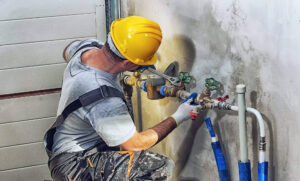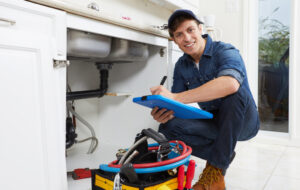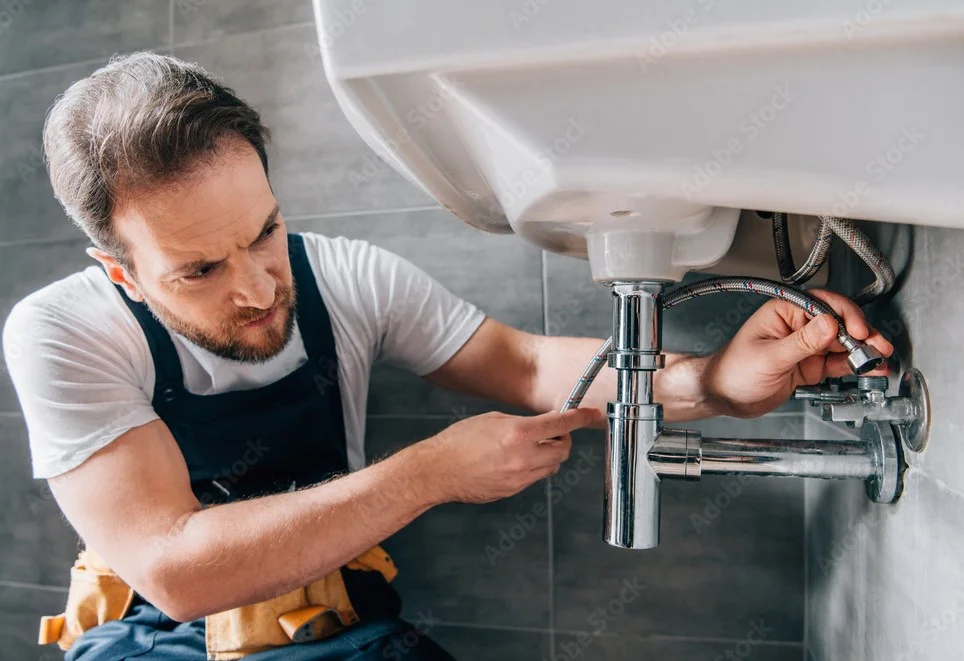Residential plumbers handle plumbing tasks related to homes, including repairing leaky faucets, installing new water pipes and toilets, and cleaning drains. They also follow blueprints and building codes when working on home construction projects.

When a plumber discovers a leak in a house, they must find out where it’s coming from. This can be not easy because houses have miles of interconnected pipes. Contact Plumbers Scranton for professional help.
Residential plumbers install new plumbing systems in homes and apartment buildings. This includes piping, fixtures and appliances like sinks, toilets, bathtubs and showers, and water heaters. They also inspect and repair existing systems. These plumbers often use blueprints and building specifications to create a plan for layout and installation, and they must follow building codes to ensure all components are properly connected and secure.
Another service residential plumbers provide is faucet installation and repair. This is a common household fixture that can break down or stop working over time, so it’s important to have a reputable plumber on call for these types of issues. Plumbers may also replace existing faucets with more efficient models. They can install or fix garbage disposals, and they may repair or replace leaking water heaters.
One difference between residential and commercial plumbing services is that residential plumbers typically deal with smaller spaces and systems. In contrast, a commercial plumber will likely work on larger buildings with more complex plumbing needs. These may include office buildings, restaurants, hospitals and more. Commercial spaces tend to have a higher volume of people using the plumbing system, so there is usually more wear and tear on parts. This can lead to more frequent repairs and replacements, which in turn means more work for plumbers.
Commercial plumbing services also involve more complicated systems, which can be difficult to navigate and maintain. These plumbers must be able to troubleshoot these complex systems and find solutions quickly. They may also need to work with other professionals in these settings, such as architects and engineers.
Residential and commercial plumbers both offer a wide range of services, but there are some key differences between the two types of jobs. For example, residential plumbers must be comfortable dealing with homeowners and their families. This can include providing customer service and explaining how the plumbing system works in the home. In contrast, a commercial plumber will often work with a variety of people in a professional setting and may not have as much direct contact with clients.
Another important difference is that residential plumbers are often responsible for maintaining the entire plumbing system in a home. This can include repairing or replacing all components from the water supply to the toilets. They may also be responsible for septic systems and sewer lines, which are often separate from the plumbing system in a home. This type of work requires more specialized training and certification than other plumbing jobs. Therefore, it’s important to choose a reputable plumbing company that employs licensed and trained technicians. These experts will be able to diagnose and repair problems quickly and efficiently. They can also perform yearly inspections to prevent serious issues down the road. These inspections can catch small issues before they become major problems, saving you money and preventing further damage to your plumbing system.
Repair
Plumbing systems are complex and often have numerous components that can be affected by wear and tear. When these parts aren’t properly maintained, they can fail and cause problems throughout the house. Residential plumbers offer a range of repair services for these systems. Some common repairs include fixing leaks, replacing toilets and faucets, and rerouting pipes. These professionals also have the skills and knowledge to install new plumbing fixtures, such as garbage disposals and water heaters.
Leaks are one of the most common reasons homeowners call a plumber. These plumbing issues can lead to expensive damage if not addressed quickly. Plumbers use a variety of tools and techniques to identify and fix leaks in various locations, including the basement and crawl spaces. They may also have to replace parts, such as valves and washers, in order to fully resolve the problem.
Another common plumbing issue is clogged drains. These can occur when food, soap scum, and other debris enter the pipes and block the flow of water. Residential plumbers can clean out these drains using a variety of methods, including chemical cleaners and hand-held snakes. In some cases, a residential plumber might need to remove and replace entire sections of pipe.
Licensed plumbers can also help prevent plumbing problems by performing regular maintenance checks. These services are usually available for a flat fee and can include cleaning out drains, inspecting fixtures, and checking for any potential problems. Maintenance checks are a great way to catch issues before they become serious and save money in the long run.
Commercial and industrial plumbers work in a variety of environments, from office buildings and retail stores to hospitals and factories. These plumbing professionals must be able to interpret blueprints and understand how different building systems work together. They may also need to coordinate with construction teams and facility managers to ensure that plumbing systems are integrated into the overall building infrastructure.
Residential plumbers can also assist with a variety of other tasks, such as installing gas lines for stoves and ovens, installing water softeners, and more. In addition to these duties, they must be comfortable working in a wide range of weather conditions. This is because the temperature of plumbing systems can have a significant impact on the function and performance of these systems. For example, freezing temperatures can freeze and crack pipes, while hot weather can make water expand and cause leaks. By understanding these differences, plumbers can prepare themselves for different weather conditions and ensure that their customers’ plumbing systems are in good condition.
Replacement
As the name suggests, residential plumbers specialize in the installation and repair of plumbing fixtures inside living spaces. This includes kitchens, bathrooms, and laundry rooms. These plumbers also work on water supply lines, sewage systems, and garbage disposals. They can even replace toilets and other major household appliances when they are outdated or damaged beyond repair.
Licensed residential plumbers are also trained in new construction, and they are able to install the plumbing system for an entire home. This includes preparing the site for plumbing, cutting and measuring pipes to fit them in place, and installing all of the necessary components. Then, they can finish the installation with drywall, insulation, and tiles as needed.
One of the most common services that these plumbers offer is replacing water heaters and other major appliances. If a water heater is in poor condition, it may leak or break frequently, and this can lead to flooding, mold growth, and other issues that affect the health and safety of your family. Residential plumbers can replace your old water heater and get it up and running in no time.
When you are looking for a plumber to come and fix your clogged drains or to install a new water heater, you should check the online reviews of the plumbing company before you call them. This will help you find out what past clients thought of the service and whether they were satisfied with the results. A reputable plumbing company will have years of experience and will be more likely to provide excellent customer service.
Another way to ensure that you are hiring the right person for your job is by checking their license and insurance coverage. This will help you avoid any potential problems that may arise during the project, such as the plumber refusing to work on a gas line or not having the appropriate skills. Lastly, you should also check the plumber’s website for a list of their services and prices. This can give you a good idea of what to expect from the plumber in terms of pricing and what type of equipment they will use for each service.
While residential and commercial plumbers both share many of the same core responsibilities, there are some significant differences that set them apart. For instance, a commercial plumber works in a variety of different environments, including office buildings, malls, and hospitals. This means that they need to be familiar with a variety of different construction codes and regulations.






